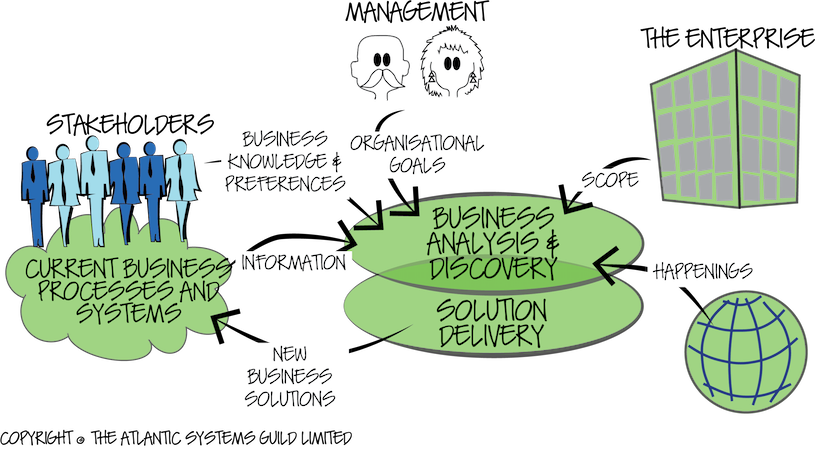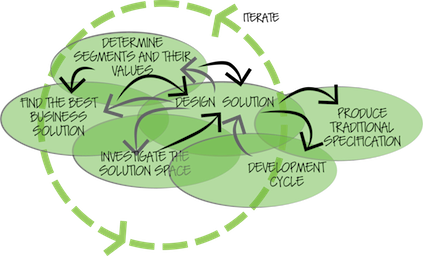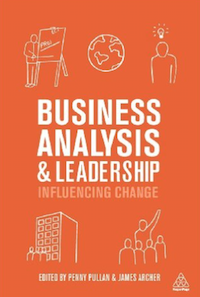
Business Analysis Agility
23-24 April 2018 (10-18h)
Location: Parker Hotel (Diegem)
Presented in English by James Robertson and James Archer
Price: 1450 EUR (excl. 21% VAT)

This event is history, please check out the NEXT SESSION
Check out these related open workshops:
- Generatieve Business Analyse (4de sessie) (May 28, 2024)
Check out our related in-house workshops:
- BPMN 2.0 Syntax and Positioning (In-Company) (INHOUSE WORKSHOP - On Request)
- BPMN 2.x in Practice (In-Company Workshop) (INHOUSE WORKSHOP - On Request)
- Case Modellering en CMMN in de Praktijk (INHOUSE WORKSHOP - On Request)
- Business Analyse Technieken (Workshop) (INHOUSE WORKSHOP - On Request)
- BPMN Jumpstart (In-Company) (INHOUSE WORKSHOP - On Request)
- Apache Spark Hands-On Training (In-Company) (INHOUSE WORKSHOP - On Request)
- Het Logisch Datawarehouse - Architectuur, Ontwerp en Technologie (INHOUSE WORKSHOP - On Request)
- Case Modelling and CMMN in Practice (INHOUSE WORKSHOP - On Request)
- Business Intelligence en Datawarehousing Fundamentals (INHOUSE WORKSHOP - On Request)
- Big Data Oplossingen voor BI (INHOUSE WORKSHOP - On Request)
- Lean Business Analyse (INHOUSE WORKSHOP - On Request)
- BizAgi Modeler in Theorie en Praktijk (INHOUSE WORKSHOP - On Request)
- Business Analyse Technieken (Tweedaagse Workshop) (INHOUSE WORKSHOP - On Request)
- Business Rule Modellering met DMN en BPMN (INHOUSE WORKSHOP - On Request)
- Business Analysis Agility (INHOUSE WORKSHOP - On Request)
- Minimum Viable Products (MVPs) Demystified (INHOUSE WORKSHOP - On Request)
- Aan de Slag met RPA, UiPath en Blue Prism (INHOUSE WORKSHOP - On Request)
Learning Objectives
What will you learn here ?

By attending this two-day course, you will learn:
- How to identify the customer segments, and what is truly valuable to them
- How not to assume a solution, but to discover the real problem
- How to ensure your solution solves the right problem
- How safe-to-fail probes prove your solution delivers value
- How to design more usable solutions
- How to use story maps to display the narrative of your product
- How to integrate business analysis practices with agile delivery
- How business analysis agility helps you to write better traditional requirements specifications
- How to be a better business analyst
Special Features
- Teaching chapters are reinforced with hands-on workshops
- The course is run interactively with lots of opportunity to discuss issues with the instructor, and with other participants
- You are shown how the course applies to your own work situation
- Your instructors have real world experience, and are willing to discuss how you can be most effective doing business analysis in your organisation
Why we organize this workshop: Increasing importance of business analysis and business analysts
| FREE BOOK for all participants: |
|
|
Whether you work in an agile team, or write traditional specifications, the essential business analysis task is to uncover the real needs of the real customers. Without understanding the real need, it is extremely difficult to deliver real value.
Your organization is constantly having to adapt to the relentless changes to its environment – changes to the law, changes in the marketplace, changes in technology, and changes to the available opportunities. Any change results in a development effort to deliver a new or enhanced software system, business process, consumer product or service. Furthermore, the rate of change is so rapid that we simply don’t have time to get the wrong result and deliver the wrong solution.
This course is about using analytical skills to understand the real, underlying problem to solve. It is about integrating business analysis skills into your team regardless of whether it is an agile team, or a more traditional one producing a complete requirements specification. It is about ensuring that you always deliver the right solution, and that you deliver quickly.
Who should attend this workshop ?
Business analysis is a skill that should be present in all development efforts, and in day-to-day organisational tasks. The skill is usually, but not necessarily, associated with job titles such as:
- Business Analyst
- Product Owner
- Agile Team Member
- Systems Analyst
- Project Leader
- Requirements Engineer
- Product or Program Manager
- or similar titles.
We also believe that Business Stakeholders, Users, Software Customers and Testers will benefit from learning advanced business analysis techniques, and how they can contribute to the organisation's wellbeing.
Why should you attend this workshop ?
Despite our technological advances, the biggest problem is still the human one: how to correctly understand the customer’s real problem, and how to ensure that your solution is correctly solving that problem.
The real problem is not found by running endless prototypes past our customers. Nor is it likely that an assumed solution will deliver much value. However, analytical thinking uncovers the real needs and allows the right solution to emerge. This means:
- Finding all the customer or user segments, and which of them yields the best, and the earliest value
- Using value propositions to meet the real needs of the customers
- Using safe-to-fail probes to ensure that any proposed solution solves the right problem and delivers the right value
- Deploying an iterative approach to discovering the real problem, and progressively feeding the right stories to the delivery activity
- Understating that by discovering the right needs and solving the right problem you deliver real value to your customer and your sponsor
- Doing all this quickly and effectively
This course gives you a different approach to business analysis. This one provides a business analysis framework that works regardless of whether you are part of an agile environment and need to provide stories for iterative development, or whether you are in a traditional environment and need to produce a requirements specification suitable for more formalized environments and outsourcing.
What’s in it for You ?
Our businesses thrive or flounder on the effectiveness of their business processes, both automated and manual. Businesses with good processes provide a better service and are more responsive to their customers. The converse is also true. Business analysis is the craft of enlightened improvement to business systems and processes. Moreover, business analysis gives you ways of identifying the areas where development efforts will yield the highest value.
This two-day course in business analysis gives you the skills and tools to discover your client's real business, and to determine and demonstrate the best ways of improving it.
This course gives you a vision of the modern business analyst, one who understands the business analyst's role is much more than writing requirements. This course is a natural companion to Mastering the Requirements Process, where we teach the art of requirements writing. The models and understanding from Business Analysis Agility are the foundation for your requirements process.
Full Programme
| FREE BOOK for all participants: |
|
|
This programme is spread over 2 days, from 10h00 till 18h00, with a buffet lunch around 13h00. Our workshop leader will already be present from 9h30 to answer your questions and talk about your specific business analysis, requirements and/or innovation problems if you want this.
James Robertson and James Archer are experienced consultants, teachers, authors and practitioners whose area of concern is the requirements for products, and the contribution that good requirements make to successful projects. Their work in the area of business analysis and requirements gathering is valued by clients around the world.

We explore business analysis and show you how you can be more agile, more adaptable in your business analysis activities.
We take you through a framework for discovering the customers and their needs, for finding solutions and evaluating them, designing the business solution and getting it built. We look at how business analysis integrates with either agile or traditional development.
Identify and prioritise the customer segments. Customer, or user, segments are groups of people with the same characteristics and the same needs. For the highest priority segments, you produce value propositions that set down what you must deliver to satisfy the customers’ business needs. This value proposition is the foundation for what is to follow.
You ensure that it is worthwhile to provide value to a customer segment by looking at the value the segment brings to your organisation.
The business problem is, “How might you deliver the value proposition?” You and your team generate candidate solutions. Instead of stopping at one, you always find that subsequent candidates improve on the original.
To prove that a candidate is solving the right problem, each is the subject of a safe-to-fail probe. This is a quick, cheap experiment to determine the viability, the suitability and the outcome of a solution. You are also working with your customers to ensure that the candidate is solving the right problem and fulfilling the right need.
The solution space includes the people, software and devices used to fulfil the needs of the customer segments. When you are investigating this space, you are looking at the necessary business processes, and perhaps building process and data models of them to help with your understanding. You also scope the space so that the team can agree on the extent of the solution.
The solution involves, and is used by humans, so the investigation studies the culture and characteristics of the people involved in the solution. The investigation is quick, but thorough enough to prevent any nasty surprises for the development team.
Anything worthwhile is designed. Here you design the business solution to make it usable and convenient. The designing business analyst uses elements of the problem, the desired impact of the solution, the behaviour of the target customer segments, and the value proposition to craft the best possible solution.
Any valuable solution will be innovative. This section looks at some innovation techniques, especially in the areas of providing better information, and making the solution more convenient for its users.
Stories are fundamental to most agile development. However, if they are to be useful, the stories must be the right stories. This section gives you an approach to writing the right stories, ones that address the real customer problems.
We also show you how story maps give you a more descriptive and usable backlog. Story maps are the ideal repository for the information you are discovering, and the stories needed for the development cycles.
This section reviews the course and points out how by being agile, business analysis can be done quickly. We also look at other aspects of business analysis, how to break down silos, the minimal amount of effective documentation.
We take a look at lean thinking, and how the agile business analyst can avoid waste, unevenness and overburden.
While you can do your business analysis in an agile way, some organisations require a traditional requirements specification – so we show you how to build one from the results of your agile analysis.
Speakers

James Archer is a business analyst, consultant, teacher, writer and innovator. James is co-editor and contributing author of Business Analysis and Leadership (Kogan Page, 2014). He identifies the key to great business analysis as an inclusive leadership style, thinking innovatively, working collaboratively, acting strategically and helping people discover their real requirements.
James is one of the founders and organisers of the Business Analysis European Conference. In 2009 he was awarded Business Analyst of the Year and he has a Masters with Distinction in Innovation, Creativity and Leadership (Minnov) from City University London.
James is an associate of the Atlantic Systems Guild and has contributed to the development of and taught the Volere approach to requirements and business analysis for the last 8 years.
Specialising in health and social care, he brings a track record of designing and delivering innovative solutions to complex problems. His key role is to help senior stakeholders understand the wider strategic and business change implications of potential solutions, while James also has a rare ability to enable people at all levels of an organisation to work and think together in pursuit of lasting change.
James is a Director of Public World who are UK partners of Buurtzorg, a not for profit organization in the Netherlands that is transforming the way care at home is delivered by nurse lead self managed teams. Buurtzorg has grown from a team of 4 nurses in 2007 to over 800 teams of 9,500 nurses with a back office of only 45 staff and has won employer of the year in the Netherlands for 4 out of the last 5 years. James is working with Guys and St Thomas Hospital in London and other NHS organisations to adapt and adopt the Buurtzorg model to the UK context.
Recent clients have included Royal Mail, Waters Corporation, Ikea, the Royal Borough of Kensington and Chelsea, Westminster Council, the Norwegian Court Administrative Service, Credit Suisse, Estonia Energy and Honeywell.

James Robertson is a consultant, teacher, author, project leader whose area of concern is the requirements for products, and the contribution that good requirements make to successful projects. His work in the area of business analysis and requirements gathering is valued by clients around the world.
He is the co-author of the best-selling book "Mastering the Requirements Process, Third Edition" (Pearson, 2012, ISBN: 9780321815743). This book provides guidance on finding requirements and writing them so that all the stakeholders can understand them. He also co-founded the Volere approach to requirements engineering. His most recent book is "Adrenaline Junkies and Template Zombies: Understanding Patterns of Project Behavior", written with fellow principals of The Atlantic Systems Guild, a London and New York-based think tank known for its research into new systems engineering techniques.
James Robertson has worked on almost every type of information system. His experience has led him to write numerous seminars and papers that are well respected as sources of new software development ideas.
As well as teaching his seminars and workshops, he now advises companies on how to adapt modern software development techniques to fit specific projects, and how to effectively transfer the new technologies to the software developers within the organisation. He has formed a solid partnership with his wife Suzanne to consult on numerous large-scale projects in Europe and the United States.
James and Suzanne Robertson are principals and co-founders of The Atlantic Systems Guild.
The Atlantic Systems Guild Limited is endorsed as an education provider by the International Institute of Business Analysis (IIBA).
Questions about this ? Interested but you can't attend ? Send us an email !
